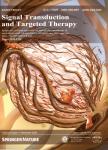Transcriptional cofactors Ski and SnoN are major regulatorsof the TGF-β/Smad signaling pathway in health and disease
作者机构:Instituto de Investigaciones Biomedicas at Universidad Nacional Autonoma de MexicoMexico city 04510Mexico Instituto de Fisiologia Celular at Universidad Nacional Autonoma de MexicoMexico city 04510Mexico Facultad de Ciencias at Universidad Nacional Autonoma de MexicoMexico city 04510Mexico
出 版 物:《Signal Transduction and Targeted Therapy》 (信号转导与靶向治疗(英文))
年 卷 期:2018年第3卷第1期
页 面:184-198页
核心收录:
学科分类:1002[医学-临床医学] 100214[医学-肿瘤学] 10[医学]
基 金:Our work is supported by grants from CONACYT(No.240224 to M.M.-S.) PAPIIT/DGAPA/UNAM(IN208115 and IN208118 to M.M.-S.,and IA200916 to A.C.T.-C.)
主 题:SnoN homeostasis Smad
摘 要:The transforming growth factor-β(TGF-β)family plays major pleiotropic roles by regulating many physiological processes in development and tissue *** TGF-βsignaling pathway outcome relies on the control of the spatial and temporal expression of500 genes,which depend on the functions of the Smad protein along with those of diverse modulators of this signaling pathway,such as transcriptional factors and ***(Sloan-Kettering Institute)and SnoN(Ski novel)are Smadinteracting proteins that negatively regulate the TGF-βsignaling pathway by disrupting the formation of R-Smad/Smad4 complexes,as well as by inhibiting Smad association with the p300/CBP *** Ski and SnoN transcriptional cofactors recruit diverse corepressors and histone deacetylases to repress gene *** TGF-β/Smad pathway and coregulators Ski and SnoN clearly regulate each other through several positive and negative feedback ***,these cross-regulatory processes finely modify the TGF-βsignaling outcome as they control the magnitude and duration of the TGF-β*** a result,any alteration in these regulatory mechanisms may lead to disease ***,the design of targeted therapies to exert tight control of the levels of negative modulators of the TGF-βpathway,such as Ski and SnoN,is critical to restore cell homeostasis under the specific pathological conditions in which these cofactors are deregulated,such as fibrosis and cancer.



